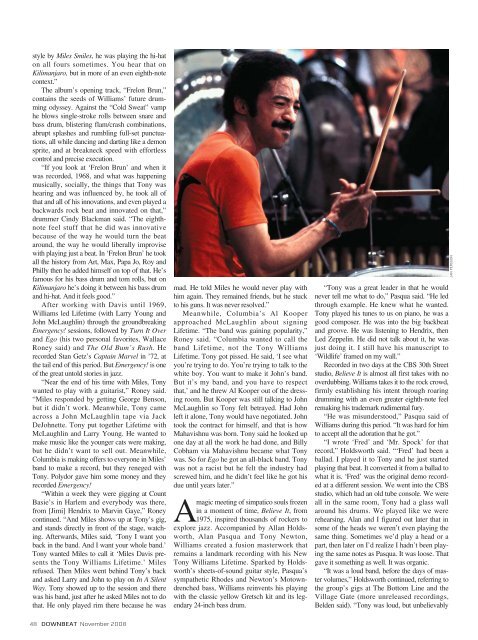Download - Downbeat
Download - Downbeat
Download - Downbeat
- No tags were found...
You also want an ePaper? Increase the reach of your titles
YUMPU automatically turns print PDFs into web optimized ePapers that Google loves.
style by Miles Smiles, he was playing the hi-haton all fours sometimes. You hear that onKilimanjaro, but in more of an even eighth-notecontext.”The album’s opening track, “Frelon Brun,”contains the seeds of Williams’ future drummingodyssey. Against the “Cold Sweat” vamphe blows single-stroke rolls between snare andbass drum, blistering flam/crash combinations,abrupt splashes and rumbling full-set punctuations,all while dancing and darting like a demonsprite, and at breakneck speed with effortlesscontrol and precise execution.“If you look at ‘Frelon Brun’ and when itwas recorded, 1968, and what was happeningmusically, socially, the things that Tony washearing and was influenced by, he took all ofthat and all of his innovations, and even played abackwards rock beat and innovated on that,”drummer Cindy Blackman said. “The eighthnotefeel stuff that he did was innovativebecause of the way he would turn the beataround, the way he would liberally improvisewith playing just a beat. In ‘Frelon Brun’ he tookall the history from Art, Max, Papa Jo, Roy andPhilly then he added himself on top of that. He’sfamous for his bass drum and tom rolls, but onKilimanjaro he’s doing it between his bass drumand hi-hat. And it feels good.”After working with Davis until 1969,Williams led Lifetime (with Larry Young andJohn McLaughlin) through the groundbreakingEmergency! sessions, followed by Turn It Overand Ego (his two personal favorites, WallaceRoney said) and The Old Bum’s Rush. Herecorded Stan Getz’s Captain Marvel in ’72, atthe tail end of this period. But Emergency! is oneof the great untold stories in jazz.“Near the end of his time with Miles, Tonywanted to play with a guitarist,” Roney said.“Miles responded by getting George Benson,but it didn’t work. Meanwhile, Tony cameacross a John McLaughlin tape via JackDeJohnette. Tony put together Lifetime withMcLaughlin and Larry Young. He wanted tomake music like the younger cats were making,but he didn’t want to sell out. Meanwhile,Columbia is making offers to everyone in Miles’band to make a record, but they reneged withTony. Polydor gave him some money and theyrecorded Emergency!“Within a week they were gigging at CountBasie’s in Harlem and everybody was there,from [Jimi] Hendrix to Marvin Gaye,” Roneycontinued. “And Miles shows up at Tony’s gig,and stands directly in front of the stage, watching.Afterwards, Miles said, ‘Tony I want youback in the band. And I want your whole band.’Tony wanted Miles to call it ‘Miles Davis presentsthe Tony Williams Lifetime.’ Milesrefused. Then Miles went behind Tony’s backand asked Larry and John to play on In A SilentWay. Tony showed up to the session and therewas his band, just after he asked Miles not to dothat. He only played rim there because he wasmad. He told Miles he would never play withhim again. They remained friends, but he stuckto his guns. It was never resolved.”Meanwhile, Columbia’s Al Kooperapproached McLaughlin about signingLifetime. “The band was gaining popularity,”Roney said. “Columbia wanted to call theband Lifetime, not the Tony WilliamsLifetime. Tony got pissed. He said, ‘I see whatyou’re trying to do. You’re trying to talk to thewhite boy. You want to make it John’s band.But it’s my band, and you have to respectthat,’ and he threw Al Kooper out of the dressingroom. But Kooper was still talking to JohnMcLaughlin so Tony felt betrayed. Had Johnleft it alone, Tony would have negotiated. Johntook the contract for himself, and that is howMahavishnu was born. Tony said he looked upone day at all the work he had done, and BillyCobham via Mahavishnu became what Tonywas. So for Ego he got an all-black band. Tonywas not a racist but he felt the industry hadscrewed him, and he didn’t feel like he got hisdue until years later.”Amagic meeting of simpatico souls frozenin a moment of time, Believe It, from1975, inspired thousands of rockers toexplore jazz. Accompanied by Allan Holdsworth,Alan Pasqua and Tony Newton,Williams created a fusion masterwork thatremains a landmark recording with his NewTony Williams Lifetime. Sparked by Holdsworth’ssheets-of-sound guitar style, Pasqua’ssympathetic Rhodes and Newton’s Motowndrenchedbass, Williams reinvents his playingwith the classic yellow Gretsch kit and its legendary24-inch bass drum.“Tony was a great leader in that he wouldnever tell me what to do,” Pasqua said. “He ledthrough example. He knew what he wanted.Tony played his tunes to us on piano, he was agood composer. He was into the big backbeatand groove. He was listening to Hendrix, thenLed Zeppelin. He did not talk about it, he wasjust doing it. I still have his manuscript to‘Wildlife’ framed on my wall.”Recorded in two days at the CBS 30th Streetstudio, Believe It is almost all first takes with nooverdubbing. Williams takes it to the rock crowd,firmly establishing his intent through roaringdrumming with an even greater eighth-note feelremaking his trademark rudimental fury.“He was misunderstood,” Pasqua said ofWilliams during this period. “It was hard for himto accept all the adoration that he got.”“I wrote ‘Fred’ and ‘Mr. Spock’ for thatrecord,” Holdsworth said. “‘Fred’ had been aballad. I played it to Tony and he just startedplaying that beat. It converted it from a ballad towhat it is. ‘Fred’ was the original demo recordedat a different session. We went into the CBSstudio, which had an old tube console. We wereall in the same room, Tony had a glass wallaround his drums. We played like we wererehearsing. Alan and I figured out later that insome of the heads we weren’t even playing thesame thing. Sometimes we’d play a head or apart, then later on I’d realize I hadn’t been playingthe same notes as Pasqua. It was loose. Thatgave it something as well. It was organic.“It was a loud band, before the days of mastervolumes,” Holdsworth continued, referring tothe group’s gigs at The Bottom Line and theVillage Gate (more unreleased recordings,Belden said). “Tony was loud, but unbelievablyJAN PERSSON48 DOWNBEAT November 2008
















